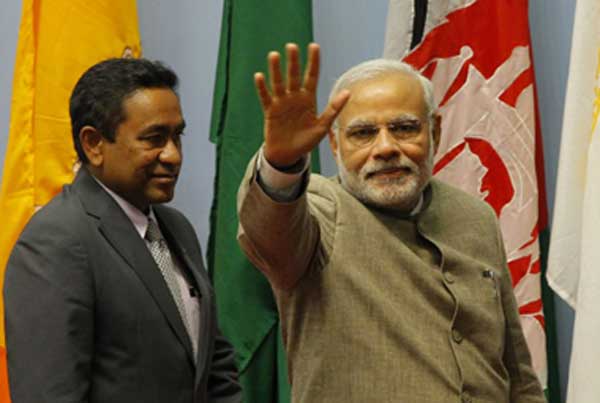South Asia – and the region – are keenly following events unfolding in the Maldives. The Maldivian Supreme Court in a landmark decision on February 1, 2018 ordered the government to release nine opposition leaders, including the exiled former president Mohamed Nasheed. The Court also reinstated 12 members of parliament who had lost their seats after defecting to the opposition.
This resulted in tensions escalating between the incumbent President Abdulla Yameen and the judiciary. To assert his authority, Yameen, using his powers under Article 253 of the Maldivian Constitution, declared a state of emergency which entails the suspension of basic rights of citizens. The Supreme Court capitulated and rescinded its earlier order on February 6.
Former President Nasheed declared the imposition of emergency and the suspension of the Supreme Court as being “unconstitutional and illegal” and, in an opinion for a national Indian daily, he argued that India should intervene in Maldives.
The article highlighted the dichotomy faced by India in relation to a possible power struggle with China from a strategic standpoint. Unlike Operation Cactus of 1988, Nasheed deliberated whether India could conduct a humanitarian intervention without infringing the fundamental tenets of international law.
After Yameen assumed power in 2013, India-Maldives relations have soured. Yameen has allied his policies favouring Beijing and handed out major infrastructure projects to Chinese companies. He also challenged India’s strategic thinkinng by allowing Chinese naval ships to dock in Male.
In 2015, Yameen amended the Maldivian constitution in order to allow for foreign nationals and entities the right to own land, including entire islands. This set alarm bells ringing in India, in light of China’s efforts to assume control over some islands as part of its monumental maritime silk road project. In December 2017, Maldives signed a free-trade agreement with China during Yameen’s Beijing visit.
Apart from unabashedly playing the China card, Yameen has also reached out to Saudi Arabia and Pakistan which has led to a growing trend of radicalization in the Maldives. Maldives remains within India’s regional sphere of influence, with many commercial and strategic interests, which are endangered because of the crisis. Additionally, there is friction between Chinese and Indian strategic interests over this island nation in maritime domain.
China has been protecting Yameen’s violations of basic democratic standards by maintaining that the situation in the Maldives is “an internal affair.” China opposed external intervention as being violative of UN Charter norms.
Yameen has called for presidential polls on September 23, but has placed major restraints on those opposing him from contesting in those polls, including their right to congregate and hold meetings.
Yet there are genuine constraints in the way of Indian intervention. India’s dilemma is compounded by the fact that it had earlier opposed any interference in the internal affairs of countries, and forced imposition of democratic norms. While there is a strong political case for intervention, there is little legal justification yet for intervention.
The principles of sovereignty and non-intervention are the cornerstone of the United Nations Charter which is the foundational treaty for relations between states. Article 2(4) of the Charter prohibits the threat or use of force against the territorial integrity or political independence of any state by an UN member state.
India cannot intervene under the prevailing circumstances on the ground of restoration of democracy. This was clarified by the International Court of Justice in a decision on Nicaragua wherein it held that “intervention is wrongful when it uses methods of coercion in regard to such choices, which must be free ones. One such area is the ‘the choice of political, economic, social and cultural system, and the formulation of foreign policy.” India’s intervention to place a government of its choice would prevent Maldives from exercising a prerogative that is rightfully only their own.
While the previous intervention by India in the Maldives in 1988 may be brought up, this was at the express invitation of the then President of Maldives, Maumoon Gayoom, and within the bounds of legality per the ICJ Nicaragua decision. Today, external intervention against the will of the incumbent Maldivian government would be illegal, even if the goal is to replace dictatorship with a democracy.
India’s unwillingness to intervene is justified by international law which limits even the right to take countermeasures against states engaged in mass atrocities.
Debates in the UN on the responsibility to protect doctrine have made it clear that there remains no consensus amongst states to engage in forceful action against non-consenting states to protect populations in those states. Despite claims by sections of the Indian strategic establishment about India’s moral duty to intervene in Maldives, India is bound by prevailing international law.





